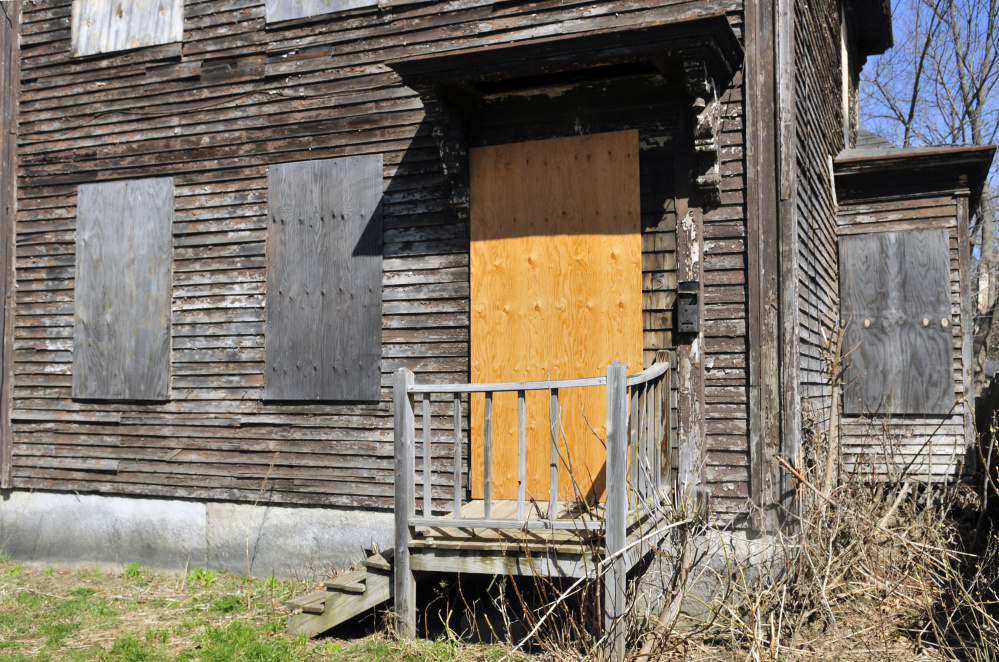AUGUSTA — City councilors approved a Property Maintenance Ordinance on Thursday that will require land and building owners to prevent their properties from falling into disrepair.
The new ordinance includes a ban on having any windows boarded up on buildings anywhere in the city, a controversial ban some councilors said could make it harder for people to keep unoccupied buildings secure.
Some councilors said exposed glass windows in an unoccupied building could be an easy target for vandals to break with rocks and feared building owners might tire of the chore and cost of replacing them.
Ward 3 Councilor Patrick Paradis said he was concerned that banning boarding up windows could make unoccupied buildings less secure because people will be able to gain access by breaking glass windows.
“I’m for the legislation,” Paradis said in support of the Property Maintenance Ordinance, but expressing concern about the ban on boarded up windows. “I don’t like the plywood at all. It has been on for years in some of the buildings. But I also see buildings in an uninhabited state — ones with broken windows. My thing is about protecting the building, the inside of abandoned buildings. Are we putting the neighborhood in harm if they can get in the windows?”
However proponents of the ban said boarding up windows shouldn’t be a permanent solution and buildings with boarded-up windows are an eyesore that can detract from the appearance of the neighboring properties around it.
“We don’t want boarded up windows in general,” said Ward 1 Councilor Linda Conti, noting that in inhabited buildings, boarding up windows prevents light and air from entering into the building. “If it is an uninhabited residence (with boarded up windows), it just becomes an attractive nuisance or an eyesore. Boarded up windows are not supposed to be a permanent solution. If you can’t afford to maintain (your buildings), sell them to somebody who can.”
Councilors voted 7-1 to approve the ordinance.
“I think our community and taxpayers will be very excited when they see people start to clean up unnecessary junk around their home, and make the city of Augusta proud again,” said Ward 4 Councilor Anna Blodgett, a leader of the committee which drafted the new ordinance.
At-Large Councilor Jeffrey Bilodeau, the lone dissenting vote, did not comment Thursday on why he voted against it. However, Bilodeau previously has expressed concern that the ordinance could punish people who can’t afford to maintain their homes in accordance with its standards.
The ordinance forbids property owners to keep any motor vehicles that haven’t been registered and inspected for one year within 150 feet of a public right of way unless they are in a garage or buffered from public view; from having pipes, fans or ducts that discharge grease, steam, vapor or gaseous wastes directly upon abutting or adjacent public or private property; and from storing refrigerators that are not in operation on their properties.
The ordinance requires owners to prevent their properties from becoming infested with rodents.
It also requires property owners within the state Department of Transportation-defined urban compact area — generally the urban part of the city — to maintain their properties free from weeds or plant growth in excess of 10 inches. It makes exceptions for hayfields and pastures that are being managed actively, and for coastal or floodplain wetlands.
Mayor David Rollins said the ordinance originally was aimed at banks foreclosing on properties and not maintaining them and absentee landowners who do nothing to maintain their properties here. He said it is meant to give city code officers the tools they need to go after the worst offenders and the city’s most derelict, poorly maintained buildings.
“The spirit of this is not to set up a police state where we’ll be nitpicking and using a ruler to measure your grass,” Rollins said.
Eric Conrad, director of communication and educational services for Maine Municipal Association, said earlier Thursday that about a dozen Maine communities, mostly in the southern or coastal parts of the state, have similar property maintenance ordinances. He said how stringent they are varies.
“These kinds of ordinances can be controversial, because some people think about property rights first: ‘Why is the town or city doing this? It’s my property,'” Conrad said. “Property owners who have great neighbors may not think about what can happen if you get a new next-door neighbor who piles things on the front lawn, doesn’t cut the grass and doesn’t maintain the home. But the neighboring, good homeowner might not like it if that happens, and the complaints will go to the city or town. Also, nearby property values can be affected. If you have a beautiful home in a nice area and suddenly a neighbor comes in and treats his property shabbily, that can affect your property value as well as his.”
Keith Edwards — 621-5647
Twitter: @kedwardskj
Send questions/comments to the editors.




Success. Please wait for the page to reload. If the page does not reload within 5 seconds, please refresh the page.
Enter your email and password to access comments.
Hi, to comment on stories you must . This profile is in addition to your subscription and website login.
Already have a commenting profile? .
Invalid username/password.
Please check your email to confirm and complete your registration.
Only subscribers are eligible to post comments. Please subscribe or login first for digital access. Here’s why.
Use the form below to reset your password. When you've submitted your account email, we will send an email with a reset code.